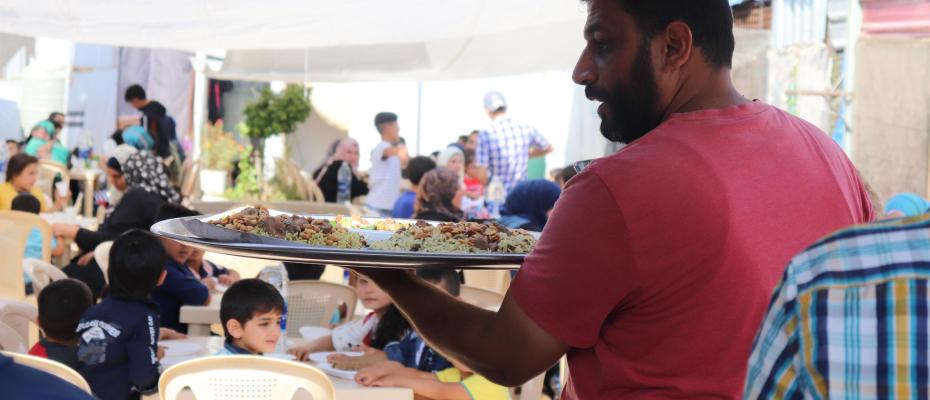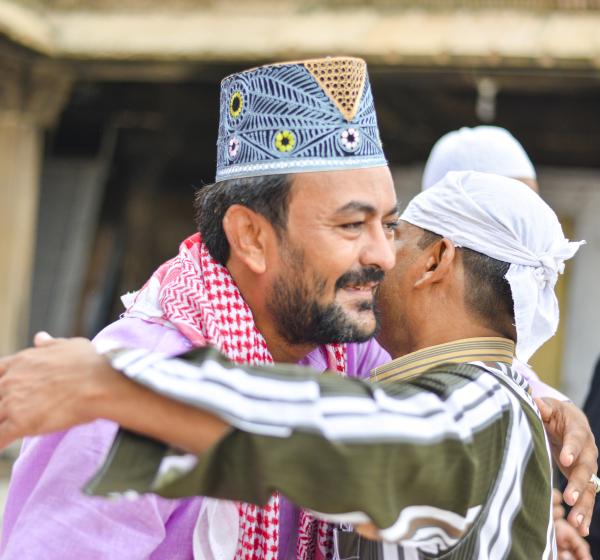There are two main, equally important Eid celebrations within the Islamic calendar: Eid-al-Fitr and Eid-al-Adha. Eid al-Fitr commences at the end of Ramadan and is a festival that celebrates the breaking of the fast. Eid al-Adha begins following the annual Hajj pilgrimage and celebrates the devotion of Prophet Ibrahim (AS) to Allah (SWT).
The Islamic calendar follows a lunar cycle, and as such, UK dates for key festivals like Eid al-Fitr rotate by approximately 10 days each year and are subject to the official moon sighting. You can find the Eid dates for 2025 below.
So, what day is Eid 2025? Eid al-Fitr begins at the end of Ramadan on the first day of Shawwal.
Here in the UK, the Eid al-Fitr 2025 UK dates will start in the evening of 30 March. Please note that all dates are subject to the official sighting of the moon for Eid, meaning you’ll need to await the Eid announcement for 2025. To learn the exact dates and times of Eid al-Fitr 2025, please consult your local imam.

Eid ul-Fitr, the end of Ramadan celebration
Muslims are set to celebrate the Eid festival at the end of the month of Ramadan, traditionally over the first three days of Shawwal, the tenth month of the Islamic calendar. The festival marks the end of Ramadan, during which Muslims around the world fast for a full month. Fasting is prohibited during Ramadan Eid 2025, and family, friends, loved ones and the local community all come together to rejoice, enjoy good food and exchange gifts.
In Arabic, Eid al-Fitr translates to “Festival of Breaking the Fast” and is a very important date in the Islamic Calendar. Throughout the blessed month of Ramadan, Muslims around the world fast between the hours of sunrise and sunset, abstaining from food, drink, smoking, chewing gum, and impure thoughts and actions. The month is spent connecting spiritually with Allah (SWT) through prayer, worship and studying the Qur’an.
In celebration of a successful Ramadan, the festival of Eid al-Fitr is a time for enjoying food and spending time with loved ones, family, and friends. Fasting is not permitted during Eid al-Fitr.
All Muslims look forward to and enjoy the celebration of Eid al Fitr. While it is a time for food and festivities with loved ones, there are also important acts that must take place in accordance with Islamic teachings.
Firstly, the dawn prayer – Fajr – is performed, followed by ritual cleansing or ablution – ghusl – as a means of purifying the body. After this, the whole family prepares for the day ahead.
Ideally, Eid Salah (prayer) takes place in the early morning (after Fajr) on the first day of Eid.
DURING THE CELEBRATIONS
Traditionally, people wear new clothes, although some simply opt for their finest outfit instead. During this time of celebration, a usual Eid greeting is ‘Eid Mubarak’, meaning to wish someone a blessed Eid. The family then heads to the local mosque for congregational worship and to pay Zakat al-Fitr, also known as Fitrana. This is obligatory for all Muslims, regardless of age, but the head of the household can make payments on behalf of dependants. Eid al-Fitr charity donations must be paid before Eid prayers, as these are distributed amongst the neediest to ensure that they can join in the Eid celebrations.
Once the communal celebrations are over, families and their loved ones head home for a celebratory feast together and traditionally, gifts or money are given, especially to children and the younger family members.

Eid ul-Fitr Celebrations | India 2014
The festival of Eid al-Fitr is a very happy time of year for Muslims, and although it is for family, friends and loved ones, it is also about ensuring the wider community is able to enjoy the festivities too. UK Islamic Mission works to ensure that our less fortunate Muslim brothers and sisters can also enjoy a blessed Eid al-Fitr. Charity is one of the greatest and most powerful gifts that you can give.
If you are looking to pay your Zakat or make Fitrana donations to help your brothers and sisters around the world, please do so with UK Islamic Mission this year. May Allah (SWT) accept it from us, Ameen.
Copyright © 2025 UKIM All Rights Reserved.
UK Registered Charity Since 1962
Charity Registration No. 250275


